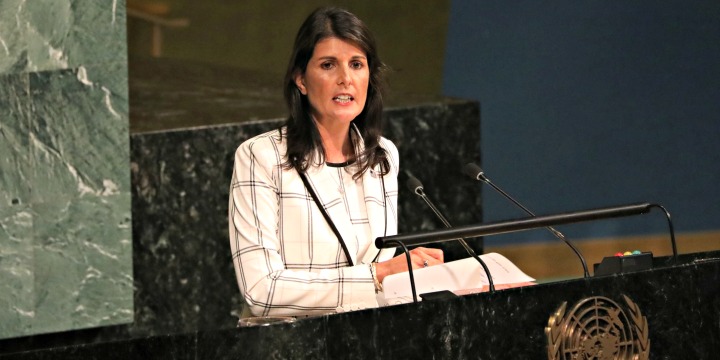“This is a long time coming. From very early on in the Trump administration, there have been voices in Washington, as well as in Israel, calling for the move,” Jonathan Schanzer, vice president for research at the Foundation for Defense of Democracies, told JNS.
According to Schanzer, a number of justifications have been proposed regarding the alteration of US policy on the Golan.
“They vary from observers who say Syria is barely a country any longer due to the civil war, as well as the counterfactual proposition that had Israel ceded the territory to the Assad regime years ago. … The other argument is [that] Israel has effectively solidified control over the Golan and there is no going back, regardless of what happens in Syria,” he said.
“Another argument is that given the mass murder in Syria, nobody should provide Assad with positive reinforcement, and should … delegitimize him and his rule.”
Nevertheless, Schanzer believes that the core of the move by the United States is the Trump administration’s policy of ending “Israel-bashing” at the United Nations.
Israeli officials were quick to praise the decision by the United States.
“The change in the American voting pattern is another testament to the strong cooperation between the two countries,” said Israeli Ambassador to the UN Danny Danon. “I thank Ambassador Haley for her continued steadfastness with Israel and the truth. It is time for the world to distinguish between those who stabilize the region and those who sow terror.”
Strategic Affairs Minister Gilad Erdan also commented on Twitter: “The Golan is part of Israel and it will always be. There is no sane person who thinks that the Golan will return to the murderer Assad and the Iranian regime, which is trying to establish a ‘Syrian Hezbollah’ in the region.”
Israeli Prime Minister Benjamin Netanyahu has been outspoken in saying that the international community should recognize Israel’s sovereignty over the Golan Heights, especially in light of the growing threat posed by Iran and its terror proxy Hezbollah.
In October, Netanyahu reiterated this demand following Russia’s decision to deliver the advanced S-300 anti-aircraft system to Syria.
“Israel in the Golan Heights is a guarantee for security. Israel in the Golan Heights is a fact the international community must acknowledge,” he said. “As long as it depends on me, the Golan Heights will stay under Israeli sovereignty. Otherwise, Iran and Hezbollah will be sitting on the shores of the Sea of Galilee.”
The Israeli leader has also held out hope that the United States would recognize Israel’s claim.
However, National Security Adviser John Bolton said “there’s no discussion of it,” and that while the Trump administration understands Israel’s concerns regarding the Golan, “there’s no change in the US position for now.”
Professor Eugene Kontorovich, director of International Law at the Jerusalem-based Kohelet Policy Forum and a professor of international law at George Mason University in Washington, DC, said that Israel’s control of the Golan is both legal and a recognition of the facts on the ground.
“US recognition of the Golan as Israel’s is an accord with international law and reality. Failing to do so only encourages the ambitions of the Iran-Syria axis to reconquer the territory,” he said.
Kontorovich said that the US decision was a step in the right direction.
“Hopefully, Friday’s UN vote is a step in this direction; in any case, it is a welcome rebuke to the UN’s practice of passing dozens of biased resolutions targeting Israel, while empowering despots like Assad.”
Sean Savage is a writer for JNS.
 US Issues Further Sanctions on Iran, Targets Drones
US Issues Further Sanctions on Iran, Targets Drones UN Rapporteur With History of Anti-Israel Animus Supports Pro-Hamas Protests on College Campuses
UN Rapporteur With History of Anti-Israel Animus Supports Pro-Hamas Protests on College Campuses We Need to Invest in Academic Research on Antisemitism Now
We Need to Invest in Academic Research on Antisemitism Now US Academic Skews Stats to Compare Gaza to Actual Case of Genocide
US Academic Skews Stats to Compare Gaza to Actual Case of Genocide WIll Israel-Iran Conflict Spiral Out of Control — or Will Both Sides Play It Safe?
WIll Israel-Iran Conflict Spiral Out of Control — or Will Both Sides Play It Safe? It’s All About ‘Time’: Israel Cannot Survive If It Does Not Address Iranian Nuclear Weapons
It’s All About ‘Time’: Israel Cannot Survive If It Does Not Address Iranian Nuclear Weapons US, 17 Other Countries Urge Hamas to Release Hostages, End Gaza Crisis
US, 17 Other Countries Urge Hamas to Release Hostages, End Gaza Crisis Iranian, 2 Others Detained in Peru Over Plot to Kill Israelis
Iranian, 2 Others Detained in Peru Over Plot to Kill Israelis Iran Sentences Rapper Toomaj Salehi to Death Over 2022-23 Unrest
Iran Sentences Rapper Toomaj Salehi to Death Over 2022-23 Unrest Netanyahu: ‘Antisemitic Mobs Have Taken Over Leading U.S. Universities’
Netanyahu: ‘Antisemitic Mobs Have Taken Over Leading U.S. Universities’




 US Issues Further Sanctions on Iran, Targets Drones
US Issues Further Sanctions on Iran, Targets Drones Netanyahu: ‘Antisemitic Mobs Have Taken Over Leading U.S. Universities’
Netanyahu: ‘Antisemitic Mobs Have Taken Over Leading U.S. Universities’ Iran Sentences Rapper Toomaj Salehi to Death Over 2022-23 Unrest
Iran Sentences Rapper Toomaj Salehi to Death Over 2022-23 Unrest Iranian, 2 Others Detained in Peru Over Plot to Kill Israelis
Iranian, 2 Others Detained in Peru Over Plot to Kill Israelis US, 17 Other Countries Urge Hamas to Release Hostages, End Gaza Crisis
US, 17 Other Countries Urge Hamas to Release Hostages, End Gaza Crisis